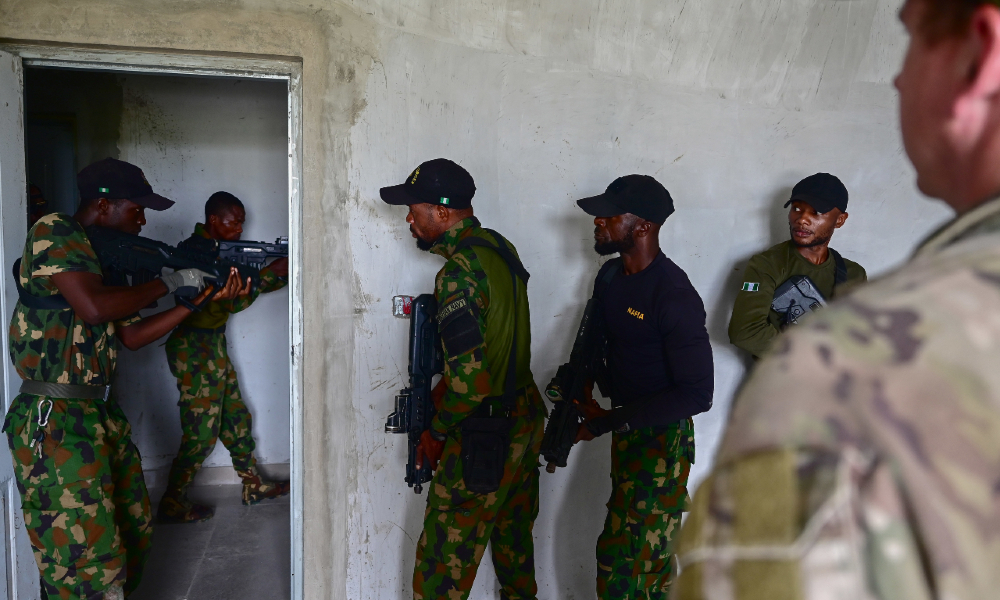Today's Headlines and Commentary
The United Nations yesterday said that the Islamic State is committing war crimes including genocide against the Yazidi community in Iraq and Syria, according to a report reviewed by the Associated Press. The U.N.
Published by The Lawfare Institute
in Cooperation With

The United Nations yesterday said that the Islamic State is committing war crimes including genocide against the Yazidi community in Iraq and Syria, according to a report reviewed by the Associated Press. The U.N. estimates that roughly 5,000 Yazidi men were killed when the Islamic State took control of Iraq’s northwest and over 3,200 Yazidi women and children are still captive. The boys are trained and indoctrinated as Islamic State fighters while women are enslaved and sexually abused. The bulk of the Yazidis’ 400,000 people have been displaced. The U.N. Inquiry on Syria, which produced the report, intends to use these findings to build a legal case against those responsible either in the International Criminal Court or an ad-hoc tribunal. “We regard this as a road map for prosecution,” said commission member Carla Del Ponte, adding “It is time now to start to obtain justice for the victims.”
In the fight on the ground, the Voice of America tells us that Iraqi security forces have entered the city of Fallujah three weeks after their assault of the Islamic State stronghold began. Fallujah was the first major city that the Islamic State seized in 2014 and its liberation would be a crucial marker in the growing tide against the Islamic State. The so-called caliphate's resources have come under increasing strain in recent months as it fights losing battles in both Syria and Iraq. Roughly 40,000 civilians have fled Fallujah in the last few weeks but many of the men have been tortured or killed by sectarian militia forces that have been assisting the Iraqi government. Al Jazeera has more on the civilians’ plight.
As the Islamic State’s defeat and dismemberment looks increasingly likely, a top Kurdish official told Reuters that Iraq should be divided into three separate entities to prevent further conflict. Masrour Barzani, head of the Kurdish Regional Government’s (KRG) Security Council, said the levels of mistrust between Iraq’s various ethnic groups were so high that they should not remain “under one roof.” Other Iraqi politicians interviewed warned that such a proposal would only spark more violence as groups fought for coveted land and valuable resources.
Kurds in Syria are also making similar claims to Reuters. As U.S.-backed militias advance against the Islamic State in northern Syria, Syrian Kurds are already setting up the groundwork to launch a new federal system of government that will devolve more power to regional leaders. The Kurdish YPG militia has proven to be a powerful partner for the Syrian Democratic Forces, and Syrian Kurds intend to incorporate Manbij once the coalition seizes the city from the Islamic State. This development is yet another that will likely worry Turkey, which has long been sensitive to Kurdish political influence in Syria out of fear that Turkish Kurds too will clamor for more political power or independence.
The Russian Defense Ministry said a 48-hour truce has been declared in the rebel-controlled city of Aleppo in northern Syria. Fighting in Aleppo has intensified in recent months as Russia has expanded its involvement in the conflict and President Bashar al Assad pledged to the Syrian Parliament that he would fight until “every last inch” of Syria was returned to his control. International humanitarian groups welcomed the 48-hour truce, which comes just days after Syrian airstrikes hit a number of hospitals in Aleppo including a U.N-supported pediatrics center, but they warned that the window of time was not sufficient to provide the necessary assistance for the civilians in the city.
Director of the CIA John Brennan testified in front of the Senate Intelligence Committee today in light of the Orlando nightclub massacre. He noted that the Islamic State has lost major swathes of territory in recent months and efforts such as those in Fallujah and the northern Syrian city of Manbij are close to success. In addition, Brennan said U.S. airstrikes have been effective in eliminating individual Islamic State leaders. But he warned that the Islamic State would “compensate for territorial losses” by executing high-profile attacks outside of its territory such as those in Paris and Brussels. He also added that the attacks of San Bernardino and Orlando demonstrate that the Islamic State is encouraging the group’s sympathizers to launch strikes at home rather than travel to Syria or Iraq.
The Washington Post updates us as law enforcement and intelligence agencies continue to investigate the Orlando massacre and Omar Mateen’s motives. According to a letter Senator Ron Johnson (R-WI), chairman of the Senate Homeland Security Committee, sent to Facebook requesting the company’s assistance, Mateen had posted a Facebook status pledging allegiance to the Islamic State and making a demand that the United States cease its airstrikes in the Middle East. The Post’s profile also examines the family Mateen left behind.
The Associated Press reveals that Reynaldo Gonzalez, a man whose daughter died in the Bataclan massacre, is suing Google, Facebook, and Twitter. Gonzalez, who filed the suit in the U.S. District of Northern California, claims that the social media conglomerates provided “material support” to the Islamic State and other Islamic extremists in violation of the law. According to the suit, the companies “knowingly permitted” radical groups to recruit new members, raise funds, and spread “extremist propaganda” over their digital platforms. The Gonzalez case is similar to one that a widow whose husband died in Jordan brought against Twitter in January. Lawfare’s Ben Wittes said in May that Twitter should prevail in that case because the causal link between the company’s alleged support for the extremists and the attack is tenuous.
Barak Mendelsohn pens a feature for Foreign Affairs examining the ongoing civil war between the Islamic State and al Qaeda. He asks whether the two terrorist organizations will eventually merge given their shared adherence to a radical strand of Salafist Islam and similar desire to create a caliphate.
The New York Times reports that France has relaxed some of its gun control laws, permitting off-duty police officers to carry their firearms even when the nation is not at a state of emergency. The policy shift on Wednesday comes two days after an Islamic State assailant killed a police officer and his partner. The news also comes on the heels of an announcement that Belgian and French intelligence officials have received information that a group of Islamic State operatives have left Syria to conduct attacks in the two countries. The Washington Post has more on that story.
Adding to the recent wave of suicide attacks launched by the Islamic State, at least 16 Libyan militia fighters were killed in two separate attacks near Sirte. The attacks were part of the Islamic State’s efforts to stall the progress of anti-ISIS forces, which in recent weeks, have overtaken large areas of Sirte.
In an interview published by Germany’s Bild newspaper, NATO Secretary-General Jens Stoltenberg announced that a major cyber attack could trigger Article 5, NATO’s mutual defense guarantee. Stoltenberg’s comments come in the wake of NATO’s recent decision to designate cyber as an official operational domain of warfare, on par with air, sea and land.
According to a report by Human Rights Watch, over 400 protestors have been killed by Ethiopian security forces since a November crackdown in the Oromia region. Protests originally erupted after the announcement of a government plan to expand the municipal boundaries of the capital into Oromia, which would strip farmers of land. Getachew Reda, Ethiopia's communication minister, disputed the number of protesters killed and claimed security forces did not respond with disproportionate force.
Pakistan and Afghanistan are in talks to halt fighting at a main border crossing, according to Pakistan’s foreign ministry. Over twenty soldiers have been wounded and at least three killed in the fighting, which erupted after Pakistan began building a gate on its side of the Torkham border in an alleged effort to prevent illegal crossing.
The Wall Street Journal tells us Iran is suing the U.S. in the International Court of Justice over charges that the U.S. violated a 1955 treaty by freezing nearly $2 billion in Iranian banking assets. Iran alleges that frozen assets to which the U.S. was not entitled were seized and distributed to victims of alleged Iran-linked terror attacks. The case comes at a time during which tensions between the U.S. and Iran appear to be easing. Whether the ICJ has jurisdiction in the case remains unclear, with the U.S. accepting the court’s oversight only on a case-by-case basis since 1986.
The UAE announced that “war is over” for its troops in Yemen, though it allowed for the possibility of keeping troops in the region for “counterterrorism operations.” The UAE first intervened over a year ago to assist forces loyal to Yemen’s government ward off advancements by Shia Houthi rebels and to drive al Qaeda from the city of Mukalla. The announcement comes after a string of recent losses suffered by the UAE in the region, including four pilots killed in helicopter crashes this week. Over 80 Emirati soldiers have been killed in the operation.
In the latest in a series examining the impact of China’s Great Firewall, The Washington Post details an anonymous IT professional’s ability to circumvent the Firewall, the world’s most extensive system of online censorship. The case study illustrates the Chinese government's measured tolerance in allowing minor cracks in its system and questions the source of the system’s power.
An individual going by the name of “Guccifer 2.0” claimed credit for hacking the Democratic National Committee’s network, writes the Post. Crowdstrike, the cybersecurity firm investigating the breach, disputed the claim, maintaining that “two separate Russian intelligence-affiliated adversaries” were responsible for the hack.
The Hill reports that an amendment passed in the House on Wednesday would prevent transferring detainees from the Guantanamo Bay detention facility to any country. The move comes during a time of heightened concern over releasing detainees, with recent reports indicating that at least a dozen former detainees have launched attacks after being released. If signed into law, the amendment would be the strictest prohibition on transfers from Guantanamo yet.
ICYMI: Yesterday, on Lawfare
Walter Pincus reflected on his lifetime in journalism to sound a note of caution about contemporary press attitudes toward government secrets.
Herb Lin analyzed important aspects of NATO’s decision to designate cyber as a domain of conflict.
Paul Rosenzweig reviewed some of the facts and flaws regarding the operation and management of terrorist watch lists.
Cody Poplin shared the newly released CIA documents related to the agency’s enhanced interrogation and rendition program under the Bush administration.
Email the Roundup Team noteworthy law and security-related articles to include, and follow us on Twitter and Facebook for additional commentary on these issues. Sign up to receive Lawfare in your inbox. Visit our Events Calendar to learn about upcoming national security events, and check out relevant job openings on our Job Board.






